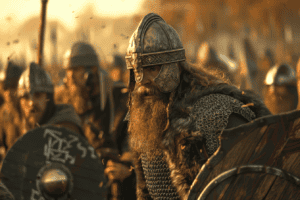Friday, the day many of us eagerly await all week, is actually named after a Norse goddess.
Frigg, the goddess of love, beauty, and fate, was a powerful figure in Norse mythology, celebrated for her wisdom and foresight.
Even more intriguing is the cultural exchange that led to the naming of this day. The merging of Roman and Germanic traditions has left a lasting mark on our modern calendar.

The ancient Romans named the days of the week after seven celestial bodies they believed influenced their lives. They associated each day with a particular deity or planet, which was thought to have a significant impact on their daily lives.
The Roman week began with Sunday, named after the Sun, and followed by Monday, named after the Moon. Tuesday, Wednesday, and Thursday were named after Tiw, Woden, and Thor, respectively, who were Germanic gods adopted by the Romans.
Friday, the day of the week in question, was named after Venus, the Roman goddess of love and beauty. Saturday, the final day, was named after Saturn, the Roman god of agriculture and time.
The Roman naming convention was later adopted by other European cultures, including the Germanic peoples, who modified the names to fit their own mythological traditions. This cultural exchange has resulted in the diverse naming conventions for the days of the week seen across Europe today.
Norse Mythology and the Goddess

In Norse mythology, Frigg, the goddess of love, beauty, and fertility, inspired the naming of Friday, a day originally dedicated to Venus in Roman mythology. This goddess, often depicted as a powerful and alluring queen, was the wife of Odin, the chief god in Norse mythology.
Frigg’s influence extended beyond the domains of love and beauty, as she was also associated with war, fate, and wisdom. Her reputation as a powerful and multifaceted goddess likely led to her day being named after her.
The Norse mythology’s influence on the naming of Friday is a testament to the cultural exchange and syncretism that occurred between the Roman and Germanic cultures. As the Roman Empire expanded, its influence reached the Germanic tribes, leading to the adoption of Roman deities and their corresponding days.
However, the Germanic tribes also retained their own mythological traditions, resulting in a blending of cultural practices. This fusion of mythologies is evident in the naming of Friday, which reflects the cultural significance of Frigg in Norse mythology.
Frigg, the Goddess of Love

Frigg’s beauty and charm captivate all, earning her the title of goddess of love. In Norse mythology, Frigg is often depicted as a stunningly beautiful woman, wearing a crown and carrying a scepter. As the wife of Odin, the All-Father, Frigg is also the queen of the domain.
Her domain includes love, marriage, and fertility, making her a revered figure in ancient Norse society. It’s said that Frigg possesses the power of foresight, but she chooses not to reveal the future to others. This enigmatic quality only adds to her mystique, making her an even more fascinating figure.
Frigg’s love for her family is also a significant aspect of her character. She’s fiercely devoted to her son, Baldur, and is grief-stricken when he meets his demise. Her love isn’t limited to her family, however, as she’s also revered for her role in promoting peaceful unions and marriages among mortals.
Frigg’s influence extends beyond the domain of love, as she’s also associated with weaving and spinning, symbolizing the intricate threads of fate that bind the universe together.
The Viking Influence on Language

Viking explorers, raiders, and traders left an indelible mark on the English language. Their linguistic heritage is evident in the numerous words and phrases borrowed from Old Norse, the language spoken by the Vikings. Many everyday words, such as ‘husband’ and ‘wife,’ have Norse roots. The Viking influence also extended to place names, with areas like Yorkshire and Whitby bearing Norse-derived names.
The Vikings’ language, Old Norse, was a Germanic language that flourished during the Viking Age (eighth to eleventh centuries).
As they settled and interacted with the local populations, they introduced their language and customs, which eventually blended with the existing Anglo-Saxon culture. This linguistic fusion resulted in the development of Middle English, which laid the foundation for Modern English.
The Viking influence on language is a tribute to their extensive cultural exchange and trade networks. Their linguistic heritage continues to shape the English language, with many words and phrases still in use today. This enduring impact is a reminder of the significant role the Vikings played in shaping the English language and culture.
Shaping the Modern Calendar

The Norse goddess Frigg, revered as the patroness of marriage and fertility, gave her name to Friday, which originally meant ‘Frigg’s day’ in Old English. As the Viking influence spread throughout Europe, their mythological heritage left an indelible mark on the modern calendar.
The seven-day week, adopted from the ancient Babylonians, was infused with Norse mythology. Tuesday, Wednesday, Thursday, and Friday were named after the gods Tiw, Odin, Thor, and Frigg, respectively.
The fusion of pagan mythology with Christian traditions resulted in a unique blend of cultural influences. The Roman Empire’s Julian calendar, introduced in 45 BCE, was modified to accommodate the Norse gods. The days of the week, initially named after celestial bodies, were substituted with the names of the Viking deities.
This syncretism of beliefs and traditions has shaped the modern calendar, which is now used globally. The legacy of the Norse gods continues to influence our daily lives, subtly reminding us of the rich cultural heritage that has shaped our modern world.










Add Comment